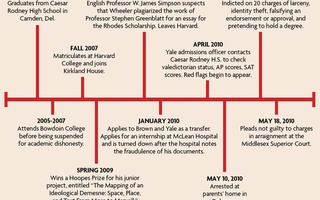
Former Harvard student Adam Wheeler, 23, was indicted on 20 counts of larceny, identity fraud, falsifying an endorsement or approval, and pretending to hold a degree.
To hear him tell it, Adam B. Wheeler has authored books, delivered lectures, and blazed through academia, grabbing one accolade after another along the way. But to those who knew him, Wheeler was a quiet and private student who just wanted to study English.
And yet, the multifaceted portrait does not end there: Prosecutors are now depicting the former Harvard student as a compulsive—perhaps even pathological—mastermind who built his academic history on a thick stack of lies.
Wheeler, 23, pled not guilty on Tuesday to 20 charges including larceny and identity fraud, following the revelation that various personal documents submitted for college, internship, and scholarship applications were all allegedly part of a “life of lies and deceit,” as described by Assistant District Attorney John C. Verner.
Those who knew Wheeler in the past said in interviews with The Crimson that he kept his personal life discreet, rarely drawing attention to himself in conversation.
“He was a good guy who didn’t talk about his academics or his life history much, but he came off as very smart,” a source close to Wheeler, who did not wish to be named, said in an interview Monday. “We just allowed him his privacy.”
One Harvard graduate said that Wheeler was “a really, really quiet guy. He very much...kept to himself. He seemed really nice.”
“He was quite clearly interested in English from the day he showed up,” the individual added.
Wheeler’s penchant for words is made apparent in an e-mail laden with thesaurus-worthy words that he sent to his fellow incoming transfer students at Harvard in September 2007.
“My own, brief, assessment of my character is that I am sententious, crypto-tendentious, slightly pedantic with a streak of contrarianism, a fascination with any pedagogical approach to Shakespeare, and a decent sense of humor,” Wheeler wrote in the e-mail, which The Crimson obtained from a recipient of the message.
Wheeler wrote that he was not a fan of sports, calling them “a neighborhood faux-pas of epic proportions,” and that he planned to study the humanities at Harvard.
In the e-mailed message, Wheeler expressed his plans to study English at Harvard, since he had not experienced the support for humanities that he so desired at MIT, where he said he had spent his first undergraduate year—contradicting prosecutors’ allegations that Wheeler actually had studied at the liberal arts college Bowdoin in Maine for two years before being suspended for academic dishonesty.
“[At MIT], I was, to put it poorly, suckled upon the teat of disdain. That being said (fortified by a reflexive snort), I was inspired therby [sic] to apply to Harvard, where the humanities, in short, are not, simpliciter, a source of opprobrium,” Wheeler wrote.
The news of his fraudulent activities came as a particular shock to the Caesar Rodney High School community due to the seeming disparity between Adam Wheeler the alleged criminal and the Adam Wheeler who quietly attended the school as a normal, but bright, student.
“He seemed to have a lot of potential and ability, so, from our perspective, this is a shock that a young man with such promise would end up doing these things,” said Kevin Fitzgerald, who was the principal of Caesar Rodney during the time of Wheeler’s attendance and is now the superintendent of the school district. “What went wrong that happened in his life to lead him to try to fool so many people? What makes a person do what he did?”
“I don’t know if any of us have the answer,” he added. “I don’t know if he even has the answer.”
Read more in News
Harvard Cuts Endowment's Stock Holdings in First Quarter of 2010Recommended Articles
-
 UPDATE: Adam Wheeler Case Raises Questions About Admissions Process
UPDATE: Adam Wheeler Case Raises Questions About Admissions Process -
Analysis: Alleged Liar May Be 'Pathological'At Adam B. Wheeler’s arraignment last week, Middlesex County Assistant District Attorney John C. Verner called Wheeler’s penchant for lying “pathological.”
-
Why Honesty Matters to UsHonesty allows us to present our actual selves to the world, and without it we cease to have an actual identity.
-
Following Alleged Probation Violation, Adam Wheeler Returned to JailAdam B. Wheeler, a former Harvard student who pleaded guilty in December to faking his way into Harvard through falsified transcripts, standardized test scores, and letters of recommendation was put back in jail Wednesday.
-
Hoop Grads Face WorldWhat does Occupy Wall Street have to do with Harvard women’s basketball?
-
Court: Wheeler Violated ProbationThe sentencing of Adam Wheeler, the former student who pleaded guilty last year to faking his way into Harvard, has been postponed pending examination by mental health officials.













